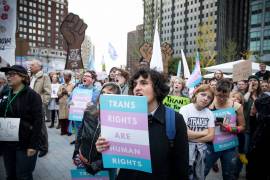
What Happened Today at the Supreme Court
Blog Search
Sitting in the Supreme Court this morning for the Prop 8 argument alongside my Lambda Legal colleagues Jenny Pizer and Camilla Taylor, I was struck by the changed world in which we now live.
Exactly 10 years ago today, the Supreme Court heard Lambda Legal’s historic Lawrence v. Texas case. At that time, 13 states still criminalized oral and anal sex and no state provided any recognition to same-sex relationships. The decision in Lawrence struck down those sodomy laws, and there are now nine states and the District of Columbia where same-sex couples may marry, and nine more that provide lesbian and gay couples virtually all the state law rights and responsibilities of marriage. As the lawyer defending the so-called Defense of Marriage Act in the case being argued tomorrow wrote in his reply brief, “Things have changed dramatically since Lawrence precisely because of Lawrence.”
What I heard today made me optimistic that we soon will see further progress. The questioning strongly suggested that the justices either will rule that the proponents of Prop 8 did not have the right to appeal the trial court’s ruling that the initiative is unconstitutional—which should again permit same-sex couples to marry in California—or will outright find Proposition 8 unconstitutional. While it is always hard to know for sure, there did not seem to be five votes to uphold the measure.
I smiled broadly when the lawyer arguing in support of Prop 8 conceded that the government almost never has even a rational basis for discriminating based on sexual orientation—a reason for granting heightened judicial scrutiny to laws that do.
I was heartened by Justice Anthony Kennedy’s statement that the voice of the nearly 40,000 children living in California with parents who are same-sex couples who “want their parents to have full recognition and full status” is “important in this case” and his reference to the “immediate legal injury” they are suffering.
When the lawyer defending Prop 8 tried to argue that only different-sex couples could procreate together, I was encouraged by Justice Elena Kagan’s insight that that might be grounds for letting them marry but it did not explain why same-sex couples should be excluded from the institution.
Further strikes came from Justice Kagan’s asking about marriage between different-sex couples who are both over 55 and Justice Ruth Bader Ginsburg’s reference to an earlier Supreme Court case that held that even those locked up in prison with no possibility of procreation have the right to marry.
Although the Perry case might not give us a definitive word about whether same-sex couples may marry in every state, the justices clearly are engaged and thinking hard about the issues. Not just accepting the status quo is one of the changes I am proud Lawrence has wrought. We now wait until June to know more but, after today’s arguments, I will rest easier tonight.
Listen to the Supreme Court argument, or read the transcript.
Learn more: Marriage at the Supreme Court
Read our blog series "From Sex to Marriage: How We Got From Lawrence v. Texas to the Cases Against DOMA and Prop 8."




